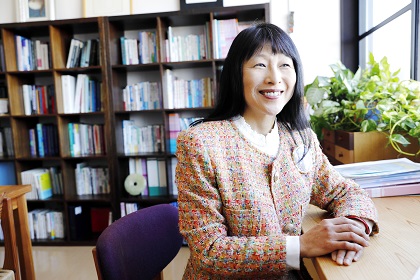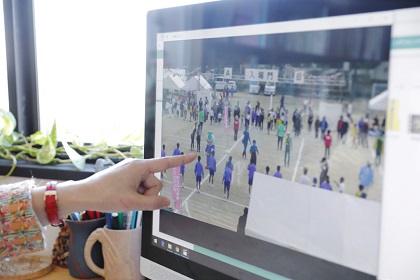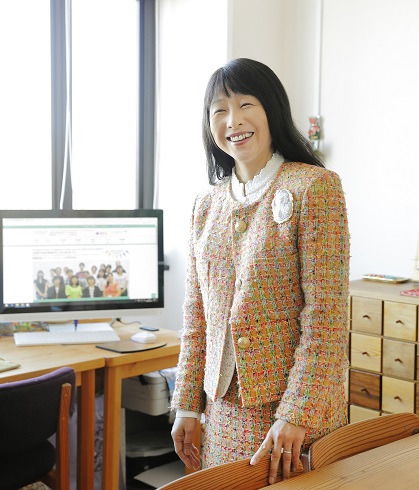TSUKUBA FRONTIER
#021 People Continue to Develop throughout Life: Empowerment to Draw Out the "Power" in Each Person
Professor ANME Tokie, Faculty of Medicine

So long as people are alive, they continue to develop day by day. This involves undergoing changes, adapting to their environment, and maintaining relations with society. Through methodology known as cohort studies, Professor Anme surveys the manner of development of people throughout their lives, and grapples with the provision of ways to maintain a society with abundant vitality
■ Development throughout One's Life Research relating to development has traditionally focused on childhood years. It has generally been thought that becoming an adult means the end of development of both mind and body and completion of the human individual, and that thereafter only decline followed. But research beginning in the 1970s lead to a widening appreciation of the fact that humans continue to develop even into old age. Physical and intellectual abilities are many and varied, and there are some that improve even in the elderly, and others that, once acquired, are not lost; although of course there are differences among individuals.
The ability of even elderly pianists to enthrall an audience is due to their ability to compensate for any decline in technique with expressive power and selection of pieces to perform. Substituting fading abilities for other abilities, and choosing what one can still execute from among these degrading abilities, are not limited to the elderly alone. Development means not just advance and improvement, but using one's current abilities to the fullest, and skillfully adapting according to the waxing and waning of one's talents. In a sense, arriving at an enlightened state is an important development in itself.

■ Empowerment as Seen from Cohort Studies In research on lifetime development, cohort studies, in which specific individuals and communities are closely observed, are indispensable. There are cases in which observations are continued periodically over several decades, with one generation of researchers handing off the baton to another.
What is vital in cohort studies is that those who are the object of study are not conscious of the fact that they are being observed. To this end, various means are devised for involving all the people in a community. Volunteers are sought, events are planned, and in other ways the community is vitalized to create opportunities for many people to participate on their own initiative. In the midst of all this, by observing the relations between different generations and changes in the consciousness and behavior of people, the manner in which the entire community is invigorated manifests as research data.
Empowerment is just this--the revitalization of individuals. Increasing one's own vitality can be difficult, but with assistance from acquaintances and from the community, it is possible to revitalize one other. Cohort studies also represent an opportunity to propose various mechanisms for empowerment.
■ Evidence Leading to Health ProgramsSurvey results obtained from cohort studies constitute the most powerful evidence among social sciences. This is because of the clear-cut time series in which what occurred earlier is a cause, and what occurred later is an effect. By comparing persons who are the objects of a study with persons who are not, it is possible to scientifically determine the extents of the causes on the effects.
Such evidence can also be reflected in the programs and policies of the national and local governments. Even when it can be intuitively understood that promotion of health and preventive care are important for keeping down medical expenses, that intuition nonetheless cannot be used to determine specifically how much support to provide for what activities. The key to designing appropriate programs is to conduct cohort studies in a number of model communities, and then quantitatively determine the relationships between activities and medical expenses.

■ Cultivating "Trendsetters" to Vitalize an Entire CommunityWe have entered what is said to be the age of century-long lifespans. This means not only that one's active years are longer, but that the period following retirement is also longer. The speed at which society changes is also increasing, so that even after reaching old age, one has to adjust to a new environment, and society expects as much. What is needed here is a system that enables an entire community to meet new challenges, facilitating communication that inspires everyone to make a real effort.
A trendsetter who takes on the responsibility for empowering such a community must have a detailed understanding of the circumstances and features of the community, and must also possess the skills, knowledge and experience to create systems and promote communication. Prof. Anme is also devoting efforts to the cultivation of persons who may become such trendsetters, who can engage in appropriate empowerment activities in communities both within Japan and abroad.
■ The Latest Technologies Supporting One's DevelopmentTechnologies such as robots that comfort and console people the way a pet might, or robotic suits that alleviate the physical burdens placed on caregivers, have already entered our daily lives. Should such technologies advance to a level at which they can provide thorough support in keeping with the delicate emotions of humans, their use will itself engender happiness in people. Prof. Anme has also begun work on research related to this, with the cooperation of various organizations.
There are predictions that the spread of artificial intelligence will bring about a sharp drop in jobs performed by humans. However, human development will continue the same. Even while marveling at the power with which people live their lives in the environments in which they find themselves, from infancy through to old age, Prof. Anme will continue research to draw out that power to its fullest

Article by Science Communicator at the Office of Public Relations


